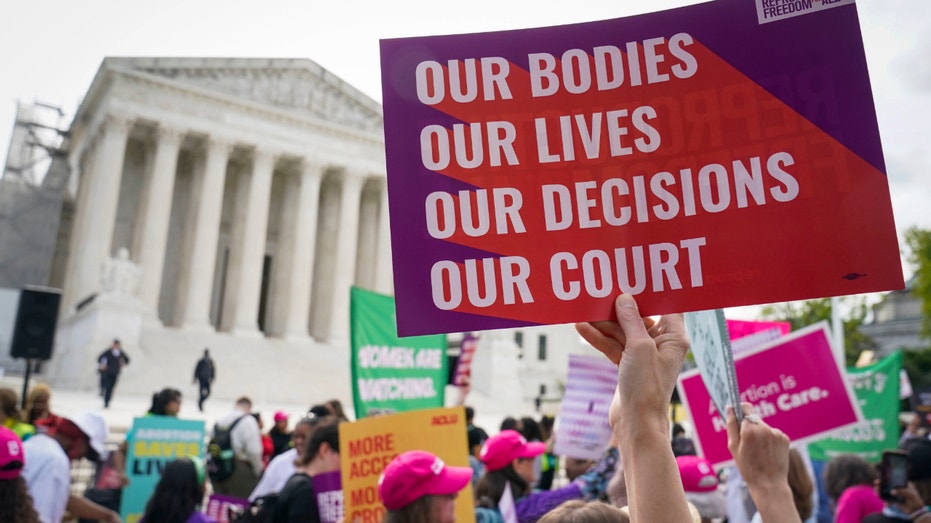Legal expert skeptical Supreme Court will 'buy' Biden admin's argument challenging Tennessee transgender law
A legal expert told Fox News Digital that the Biden administration's case against a Tennessee law banning transgender medical care for minors didn't hold water.

A legal expert is skeptical that the Biden administration will be able to convince the U.S. Supreme Court that Tennessee's ban on transgender medical procedures for minors violates the Equal Protection Clause of the 14th Amendment, saying that legal argument "will fail."
"The argument opposing the law has to create a parallel between the puberty blocker Tennessee law and previous Supreme Court precedent that involved a higher or tougher legal standard," Thomas Jipping, senior legal fellow for conservative think tank the Heritage Foundation, told Fox News Digital.
"That's what they're trying to do because the U.S. Court of Appeals for the Sixth Circuit upheld the [Tennessee] law under a very deferential standard. If that's where it stays, Tennessee will win in the Supreme Court."
On Wednesday, the high court heard oral arguments in U.S. vs. Skrmetti, a high profile case which could pose challenges to the more than two dozen other state laws banning transgender medical procedures for minors.
SUPREME COURT TO WEIGH STATE BAN ON TRANSGENDER 'MEDICAL TREATMENTS' FOR MINORS
At the center of the case is Tennesee's SB1, which prohibits medical procedures for minors when the specific "purpose" is to "enable a minor to identify with or live as a purported identity inconsistent with the minor's sex or treat purported discomfort or distress from a discordance between the minor's sex and asserted identity."
Tennessee Solicitor General Matthew Rice defended the state law, saying the restrictions on minors are based on medical purposes, not a patient's sex. He also warned these treatments can cause "irreparable" harm and have "unproven benefits."
The Biden administration's Justice Department and the ACLU, who first challenged the law, argued it discriminates based on sex and thus violates the Equal Protection Clause of the 14th Amendment.
Justice Ketanji Brown Jackson seemed receptive to that claim. At one point during the two-and-a-half hours of oral arguments, Jackson said she saw a "parallel" and "potential comparison" between the laws banning transgender care for minors and laws banning interracial marriages.
"Interesting to me that you mentioned precedent, because some of these questions about sort of who decides and the concerns and legislative prerogatives, etc., sound very familiar to me," Jackson said. "They sound in the same kinds of arguments that were made back in the day—50s, 60s—with respect to racial classifications and inconsistencies. I'm thinking in particular about Loving v. Virginia, and I'm wondering whether you thought about the parallels, because I see one as to how this statute operates and how the anti-miscegenation statutes in Virginia operated."
The landmark Loving v. Virginia case of 1967 struck down state laws banning interracial marriages based on the 14th Amendment.
Jackson's remarks drew backlash on social media, with thousands of comments expressing outrage at the comparison.
"Yes, because banning a White person from marrying a Black person is the same thing as cutting off a 10-year-old's gen*tals," co-owner of Trending Politics Collin Rugg wrote.
Jipping surmised that Jackson was trying to illustrate that if the Tennessee law did classify based on sex, it could be subject to a heightened standard that would be tougher for the state to defend.
"They're trying to shoehorn Tennessee's law into a slot that makes it tougher for the state to defend its law," he said of the Biden administration's argument.
"If a law is discriminatory based on sex, then the legislature has to jump over what's called an intermediate standard. If the law is based on race, then it has to try to get over a very, very high standard," he continued to Fox News Digital.
Jipping didn't see this argument holding water.
"The Tennessee law, the way it's written, doesn't set either a parallel to sex discrimination or a parallel to interracial marriage. And so, as a legal argument, it's going to fail," he continued.
"The ways that the U.S. Solicitor General tried to shoehorn this into sex discrimination simply doesn't work on the face of the statute. It simply doesn't work. She was trying to argue it was based on a statute that was different from what Tennessee actually enacted. So I don't think the Supreme Court is going to buy it."
The challenge to Tennessee's law was first pursued by the ACLU, who sued on behalf of parents of three transgender adolescents and a Memphis doctor.
SB1 also takes aim at health care providers in the state who continue to provide sex-reassignment treatments to transgender minors, opening them up to fines, lawsuits and other liability.
The court's ruling could have sweeping implications for other legal fights over transgender rights, including bathroom access and participation in scholastic sports. It could also serve as a legal template for future disputes involving the LGBTQ+ community, and whether sexual orientation is a "protected class" that deserves the same rights that involve a person's race and national origin.
A ruling in U.S. vs. Skrmetti is expected by July 2025.
Over two dozen states have enacted similar bans restricting minors from accessing transgender medical treatment.
Fox News' Shannon Bream, Bill Mears and Jamie Joseph contributed to this report.



